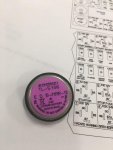... are these all problems specific to LMTVs or all Electronically controlled cat engines...
It's not really anything specific to these trucks. I have an A0, but would much rather have a newer truck. Statistically, the newer trucks are significantly more reliable than the A0's (and the A0's are still far more reliable than any other truck the military had previously). So I've wondered why the newer trucks create the perception that they are more problematic (because statistically that's all it is, perception, not reality). What I think may be happening is a couple factors...
1.) A mechanical engine fails more gracefully (e.g. it begins to run rough, and you know it's time to work on it). In an electronic engine, it runs better longer, but the second any sensor or widget fails, the engine is completely useless until repaired.
2.) An electronic engine requires special electronic tools to interface with the engine. Those tools are expensive and/or difficult to find.
3.) An electronic engine requires a deeper knowledge and comfortability with electronics/computers and all the ways the various components are influencing the running of the engine. In short, they have a steeper learning curve or barrier to entry. Old fashioned shade-tree mechanics beware.
Here is a report on the FMTV's reliability...

(M44A3 is the family of trucks which includes the M35 "Duece and a half")




